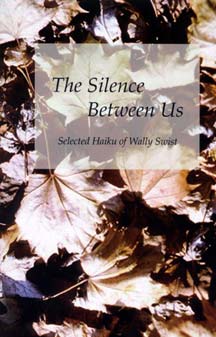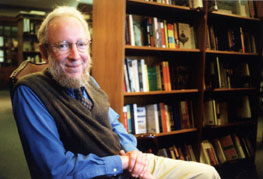The Silence Between Us:
|

ISBN: 1-929820-07-0 Brooks Books Or order this book by credit card online: Email us about postage costs for Canada |
|
farm banter |
new buds |
|
going over and over |
we wake at dawn |
His longer lyric and short narrative poems have appeared in Alaska Quarterly Review, Appalachia, The Anthology of Magazine Verse and Yearbook of American Poetry (1995-1996) (Monitor Book Company, Inc., 1997), Connecticut Review, Sanctuary: The Massachusetts Audubon Magazine, Osiris, Puckerbrush Review, Stories from Where We Live: The North Atlantic Coast (Milkweed Editions, 2000), Stories from Where We Live: The Eastern Woodlands (Milkweed Editions, 2005), and Yankee. Sahara: A Journal of New England Poetry published a special issue devoted to Swist’s work in the winter of 2003 that featured many of his new and recent poems and a typescript recorded interview regarding his craft and life as a writer. Twice he has been awarded grants in poetry from the Connecticut Commission on the Arts, in 1978 and in 2003. He has also been awarded two writing residencies at Fort Juniper, the Robert Francis Homestead, in Amherst, Massachusetts, in the autumn of 1998, and for two full years from September 2003 to September 2005. He is the General Book Manager at the University Store at the University of Massachusetts, Amherst.
|
|
|
From the Preface Wally Swist’s heart is in old books, but his soul is in haiku. He is an antiquarian bookseller by profession, a poet by necessity. Over the past 15 years, Swist has produced a fine body of haiku, arguably as fine as those written by anyone else writing in English. His haiku moments are sympathetically apprehended and precisely drawn. Swist then goes one step further, engaging all the tools of Western poetics to produce haiku that are memorable as poems, experiences in themselves. This collection presents a wide range of haiku and senryu: haiku in which we find peace in the scent of pine needles, haiku with exuberance and lightness, haiku that engage haiku traditions, both Japanese and American. In Swist’s haiku, the cycle of the seasons touches the cycle of our lives and both are altered by the interaction. We find our mental perambulations reflected in a spiral of rose petals, not merely as a symbol, but as a sympathy between our human cares and the world around us. The log sweats with the logger. The waterfall entices the couple to roar with it. The dove’s call and response is felt in the (coo)lness of our skin. Sparrows mate as dandelion embryos drift on the breeze. We feel the roan’s breath. Unlike many so-called haiku today, these are the haiku of a poet touched by seasonal consciousness while living life honestly and directly. Swist’s haiku have a materiality without materialism. Epiphanies tinged with mystery are found in the most unlikely places:
in the black spots on the cow, the sunburn on our neck, feathers on
the pond. Scientists say that we get over eighty percent of our sensory
As Swist feels the dew through the hole in his shoe, these haiku let the world in by making holes in our preconceptions. Rock with the hayrack—or with the retarded boy listening to his Walkman. Lean against the fence with the left over Christmas trees. Discover with Swist the unmarked stones in the Quaker graveyard. Drop your personality, drop your persona, and discover Swist’s world of grace. Swist has written some fine haiku that no one else could have written. Sit back and enjoy them. They are poems that are at home in any part of North America east of the Mississippi, and, I suspect, in many other places as well. Enjoy them as a celebration of life, of haiku, and of the work of visionaries such as R.H. Blyth and Robert Spiess who cultivated the American soil so that these poems could bear fruit. —Lee Gurga, Editor, Modern Haiku |
|
“Swist is in the tradition of Robert Spiess and John Wills.
Though he does not write about Spiess’ canoe country or Will’s
Tennessee, his haiku are about the same kinds of subject matter. He
writes almost solely about the woods and farms of western Massachusetts
where he has lived since the early eighties.” |
|
 Wally
Swist was born in New Haven, Connecticut in 1953. His haiku have appeared
in many periodicals devoted to the genre, including Frogpond, Mayfly,
and Modern Haiku. Also, he served as book review editor for Modern
Haiku from 1989 until 1997.
Wally
Swist was born in New Haven, Connecticut in 1953. His haiku have appeared
in many periodicals devoted to the genre, including Frogpond, Mayfly,
and Modern Haiku. Also, he served as book review editor for Modern
Haiku from 1989 until 1997.